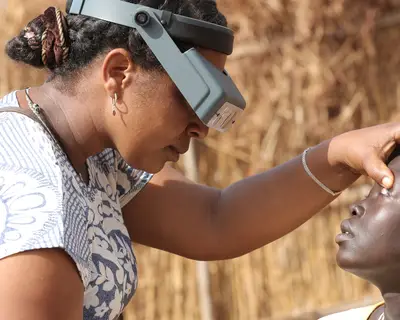Research Triangle Park, NC – The United States Agency for International Development (USAID) has chosen RTI International to implement the five-year Control & Elimination of Neglected Tropical Diseases – Element Two (CEP-NTD) Project. RTI and its team of implementers will partner with NTD-endemic countries to eliminate seven NTDs—lymphatic filariasis, trachoma, onchocerciasis, schistosomiasis, and three intestinal worms known as soil-transmitted helminths— as public health threats and build sustainable country-led systems to prevent NTDs.
“RTI is thrilled to continue to partner with USAID and the governments of NTD-endemic countries to control and eliminate NTDs,” said RTI President and CEO E. Wayne Holden, PhD. “USAID’s NTD program has provided more than 2.2 billion treatments to more than 1.1 billion people, contributing to a global effort that has eliminated the NTD threat for hundreds of millions around the world. CEP-NTD is at the heart of RTI’s mission to improve the human condition and will be another example of a foreign assistance program achieving its ultimate goal—ending its need to exist.”
RTI will lead a diverse team of partners to implement CEP-NTD, leveraging our expertise across NTDs; water, sanitation, and hygiene services (WASH); health systems strengthening; education; governance and more to implement comprehensive, sustainable solutions. The team includes five experienced NTD elimination partners: The Carter Center, Fred Hollows Foundation, IMA World Health, Light for the World, and Sightsavers. RTI has added three new partners: Results for Development (R4D), for work in domestic resource mobilization; Save the Children, for community reach and experience with school health, WASH, deworming, and nutrition; and WI-HER for gender expertise.
“CEP-NTD will expand and sustain the impact of USAID’s NTD program,” said Lisa Rotondo, who will lead the project for RTI. “RTI is honored to lead a cross-sectoral team committed to controlling and eliminating these horrific and debilitating diseases that ruin lives, burden families and communities and stifle economic growth and productivity.”
The project’s approach is based on proven, cost-effective NTD interventions including disease mapping, mass drug administration through community- and school-based distribution, disease-specific assessments, surveillance surveys, diagnostics and drug procurement, and improving data and its use. As elimination is being reached, RTI and USAID will support countries to become self-reliant in their NTD and broader health efforts. CEP-NTD will support Bangladesh, DRC, Ethiopia, Haiti, Indonesia, Laos, Mozambique, Nepal, Nigeria, Philippines, Tanzania, Uganda, and Vietnam.
RTI has been working with USAID to control and eliminate NTDs since 2006. We lead ENVISION, a global NTD project with on-the-ground implementation in 19 NTD-endemic countries, strengthening ministries of health and their national NTD programs. RTI has helped USAID to shape its monitoring and evaluation system, designing the data collection systems used by all USAID-supported countries. Additionally, RTI developed and manages USAID’s online NTD database, facilitating data analysis across countries and over time.
More than one billion people around the world are affected by one or more NTDs. Through the efforts of the global NTD community, hundreds of millions are no longer at risk and countries are eliminating the diseases:
- Lymphatic filariasis has been eliminated as a public health problem in Cambodia, The Cook Islands, Egypt, Maldives, Marshall Islands, Niue, Sri Lanka, Thailand, Togo, Tonga and Vanuatu. Vietnam is expected to announce elimination of lymphatic filariasis this year.
- Trachoma has been eliminated as a public health problem in Cambodia, Laos, Ghana, Nepal, Morocco, Oman and Mexico.
- Colombia, Ecuador, Guatemala, and Mexico have been verified free of onchocerciasis (river blindness).
As more countries prepare for their final push to control and eliminate NTDs, efforts will target the hardest-to-reach and most vulnerable communities, conduct surveys to assess impact, and help countries complete the World Health Organization’s certification process, which confirms the successful elimination of these diseases.
To learn more about RTI’s work to control and eliminate NTDs, please click here.

- The United States Agency for International Development has chosen RTI International to implement the five-year Control & Elimination of Neglected Tropical Diseases – Element Two Project
- RTI and its team of implementers will partner with NTD-endemic countries to eliminate seven NTDs—lymphatic filariasis, trachoma, onchocerciasis, schistosomiasis, and three intestinal worms known as soil-transmitted helminths— as public health threats and build sustainable country-led systems to prevent NTDs
RTI International Media Relations:
As an independent, scientific research institute with a mission to improve the human condition, RTI International is engaged by clients and partners to conduct evidence-based research and project implementation. We share our work in line with journalistic and scientific standards and maintain a record in RTI’s Newsroom.
RTI International is an independent scientific research institute dedicated to improving the human condition. Our vision is to address the world's most critical problems with technical and science-based solutions in pursuit of a better future. Clients rely on us to answer questions that demand an objective and multidisciplinary approach—one that integrates expertise across social, statistical, data, and laboratory sciences, engineering, and other technical disciplines to solve the world’s most challenging problems.
For more information, visit www.rti.org.
